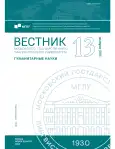FUNCTIONING OF ENGLISH FOOD NAMES IN MODERN SOCIO-POLITICAL DISCOURSE
- Authors: Bondarchuk G.G.1, Grachev G.V.1
-
Affiliations:
- Moscow State Linguistic University
- Issue: No 13(894) (2024)
- Pages: 15-22
- Section: Linguistics
- URL: https://journal-vniispk.ru/2542-2197/article/view/291475
- ID: 291475
Cite item
Abstract
The article deals with the functioning of the members of one of the basic categories of English subject names - the lexical category “Food” - in the socio-political discourse of modern English. The main purpose of the study is to examine their role in the realization of both primary nominative function and secondary additional semiotic function. The material is a linguistic corpus of CNN news texts (37864 sentences or 982107 tokens) collected in the second half of 2023 and early 2024 with the help of the author’s software “Balanced Linguistic Corpus Generator and Corpus Manager”. The article also provides a brief review of publications on the study of food names and gastronomic discourse carried out on the material of different languages.
About the authors
Galina Grigoryevna Bondarchuk
Moscow State Linguistic University
Author for correspondence.
Email: bondarchuk.gal@yandex.ru
Doctor of Philology (Dr. habil.), Professor, Professor at the Department of English Lexicology
Russian FederationGeorgiy Valerevich Grachev
Moscow State Linguistic University
Email: georgegrachev@gmail.com
PhD (Philology), Associate Professor at the Department of English Lexicology
Russian FederationReferences
- Anisimova, E. E. (2018). On the interaction of gastronomical and religious discourse. Vestnik of Moscow State Linguistic University, 2(791), 31–44. (In Russ.)
- Gorozhanov, A. I., Guseynova, I. A., Stepanova, D. V. (2024). Natural Language Processing and Fiction Text: Basis for Corpus Research. RUDN Journal of Language Studies, Semiotics and Semantics, 15(1), 195–210. 10.22363/2313-2299-2024-15-1-195-210.
- Gorozhanov, A. I. (2022). Experimental database modelling of a balanced linguistic corpus. Philology. Theory & Practice, 15(10), 3382–3386. 10.30853/phil20220563. EDN JHBAVG. (In Russ.)
- Gorozhanov, A. I. (2023). Building a linguistic corpus on natural language processing tools: Planning software solutions. Philology. Theory & Practice, 16(5), 1616–1620. 10.30853/phil20230252. EDN BHZCSE. (In Russ.)
- Grachev, G. V. (2022). The structure of the category FOOD in Old English. Cognitive Studies of Language, 4(51), 309–312. (In Russ.)
- Kovalenskaya, E. A. (2020). Peculiarities of the development of the category of food names in the last half century. Vestnik of Moscow State Linguistic University, 10(839), 109–116. (In Russ.)
- Katermina, V. V., Soloveva, N. S. (2022). Oxiological potential of English gastronym neologisms. International informational and analytical journal «Credo Experto: transport, society, education, language», 2(33), 123–135. (In Russ.)
- Taganova, T. A. (2015). New words of the English language: structural and semantic peculiarities (analysis of words denoting food). Teoriya i praktika inostrannogo yazyka v vysshey shkole, 11, 132–136. (In Russ.)
- Iakovleva, S. A. (2018). Verbal neogastronims in Spanish of Mexico. Bulletin of Moscow state regional university. Series «Linguistics», 6, 68–81. (In Russ.)
- Golovnitskaya, N. P. (2007). Lingvokul’turn•yye kharakteristiki nemetskoyazychnogo gastronomicheskogo diskursa = Linguocultural characteristics of the German- language gastronomic discourse: PhD in Philology. Volgograd. (In Russ.)
- Undritsova, M. V. (2015). Glyuttonicheskiy diskurs: lingvokul’turologicheskiye, kognitivno-pragmaticheskiye i perevodcheskiye aspekty (na materiale russkogo, angliyskogo, frantsuzskogo i grecheskogo yazykov) = Gluttonic discourse: linguocultural, cognitive-pragmatic and translation aspects (based on Russian, English, French and Greek): PhD in Philology. Moscow. (In Russ.)
- Katermina, V. V. (2017). Gastronomic picture of the world in English neology. Lingvokul’turologiya, 11, 33–47. (In Russ.)
- Olyanich, A. V. (2015). Gastronomicheskiy diskurs = Gastronomic discourse . Discourse-P, 2,159–160. (In Russ.)
- Shorokhova, Ye. A., Zhuchkova, Ye. V. (2021). Gastronomicheskiy diskurs kak vid institutsional’nogo diskursa = Gastronomic discourse as a type of institutional discourse. Molodoy uchenyy, 5(347), 162–165. (In Russ.)
- Kositskaya, F. L., Zaytseva, I. E. (2016). French gastronomy discourse and its speech genre palette. Bulletin of Tomsk State Pedagogical University, 2(167), 25–30. (In Russ.)
- Grigorenko, O. V. (2016). Foreign neonominations in Russian gastronomic lexicon. Sovremennyye aspekty gumanitarnogo znaniya (pp. 95–104): The digest of articles of an international conference. (In Russ.)
- Osetrova, M. E. (2020). Korean food products and dishes in Russian fiction and nonfiction texts. Vestnik of Moscow State Linguistic University, 10(839), 273–284. (In Russ.)
- Shumakova, A. N. (2019). On the use of anglicisms in articles about gastronomy (based on the present-day French periodicals). Vestnik of Moscow State Linguistic University, 9(825), 184–195. (In Russ.)
- Bondarchuk, G. G., Grachev, G. V. (2023). Object names as carriers of additional semiotic information (based on English everyday vocabulary). Vestnik of Moscow State Linguistic University, 5(873), 9–15. (In Russ.)
- Pashkovskaya, T. G. (2018). Concept «FOOD» in post-modernistic media-discourse (by the materials of the British press). Historical, Philosophical, Political and Law Sciences, Culturology and Study of Art. Issues of Theory and Practice. The Gramota Publishing, 2(88), 81–85. 10.30853/manuscript.2018-2.20. (In Russ.)
Supplementary files










